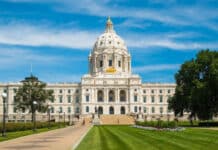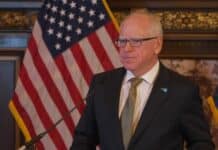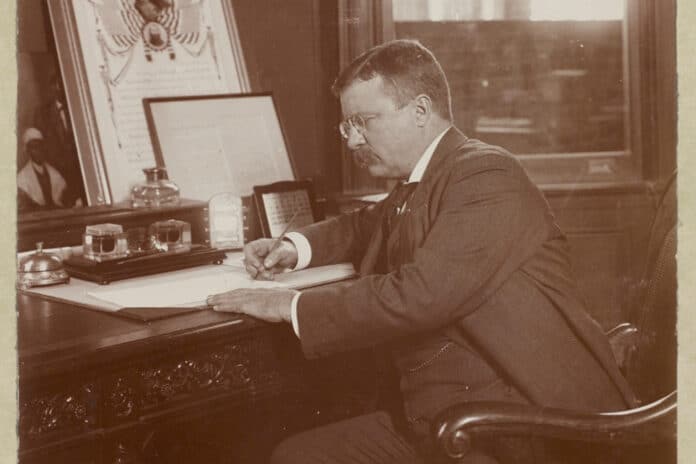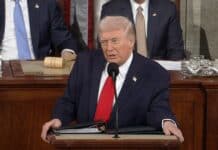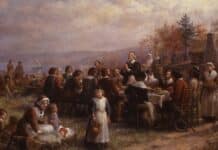The magic of Thanksgiving conjures up a trunkful of images and memories.
Some think of that long-ago harvest feast of Pilgrims and Wampanoag Indians. Others might recreate in their mind’s eye Norman Rockwell’s painting “Freedom from Want,” in which Grandma presents a roasted turkey to a table crowded with her delighted family. Our own Thanksgiving meals may pop to mind, along with those dishes that mark the holiday as special.
Singer Dolly Parton’s family, for instance, celebrates with a marshmallow-covered sweet potato casserole. In my own case, Pacific Lime Mold, which my family more simply calls “the green salad” and which appears only at Thanksgiving and sometimes at Christmas, has graced our holiday table for five generations.
But whatever thoughts Thanksgiving brings to mind, it’s a pretty safe bet that presidential proclamations aren’t among them.
An untapped source of inspiration
In late September 1789, our country’s first Congress sent a resolution to George Washington asking that he recommend a day of thanksgiving to the new nation. Washington obliged and declared Thursday, Nov. 26, “to be devoted by the People of these States to the service of that great and glorious Being, who is the beneficent Author of all the good that was, that is, or that will be—That we may then all unite in rendering unto him our sincere and humble thanks.”
As in some of his other actions, Washington set a precedent followed by his successors. Not all of our early chief executives issued proclamations of thanksgiving, but with President Abraham Lincoln’s 1863 proclamation, Thanksgiving was established as the last Thursday of November, a day hearkening back to Washington’s time. Since then, our presidents have issued an unbroken line of more than 160 Thanksgiving Day decrees.
The Pilgrim Hall Museum of Plymouth, Massachusetts, has done the rest of us a great favor by making all of these proclamations available online in an easy-to-use format. In these documents are bits of our national history, words of solace and encouragement during times of crisis and, most importantly, a summons to all of us to pause and reflect on the manifold blessings bestowed on us as a people.
Pieces of the past
Nearly all of these decrees reference events of their time.
Washington’s proclamation gave thanks to “the beneficent Author of all the good” that had protected America before the Revolution, for the “favorable interpositions of his providence … in the course and conclusion of the late war,” and for the national Constitution and “the civil and religious liberty with which we are blessed.”
Lincoln’s 1863 document offered a much more detailed and vivid history of the events of that year, naturally focusing on the war with the South. He spoke of America’s growth even in time of war—“the ax has enlarged the borders of our settlements”—the harmony that “has prevailed everywhere, except in the theater of military conflict,” and the war effort, the “advancing armies and navies of the Union.”
While the prose of the older proclamations reflected the style of their time—much longer sentences, for instance, or vague but more poetic language—the ones of the 21st century direct our attention to specific events.
In 2001, President George W. Bush noted the first Thanksgiving of the Pilgrims, touched on the effect of Washington and Lincoln on the holiday, and addressed directly “the painful aftermath of the September 11 attacks” and “our resolute war on terrorism.”
President Donald Trump’s 2020 salute to the 400th anniversary of the Pilgrims’ landing at Plymouth devoted an entire paragraph to the importance of that colony and the Mayflower Compact, and then praised the first responders of the coronavirus pandemic and of the American people in general.
Here in these documents, then, is a sort of CliffNotes of American history, a timeline of the trials and triumphs of our past.
Gifts and gratitude
As we might expect, these Thanksgiving announcements are also timely reminders of the bounties our country has conferred on us.
President Ulysses Grant’s 1873 proclamation called for an appreciation of “abundant harvests,” peace at home and abroad, and the gradual recovery of a nation “from the lingering results of a dreadful civil strife.”
In 1901, President Theodore Roosevelt lamented the assassination of President William McKinley, then reported: “Yet, in spite of this great disaster, it is nevertheless true that no people on earth have such abundant cause for thanksgiving as we have. The past year, in particular, has been one of peace and plenty.”
During his first year in office, under the black shadow of the Depression, President Franklin Roosevelt wrote, “May we be grateful for the passing of dark days; for the new spirit of dependence one on another; for the closer unity of all parts of our wide land.”
Here, along with the turkey, dressing, and other condiments of our tables, is food of another kind, the spiritual meat and drink of blessings remembered and honored.
The giver of every good
To be thankful requires some sort of benefactor. From Washington to President Joe Biden, presidents have expressed gratitude to a deity for the gifts and advantages given the American people: liberty and our republic, the bounteous harvests and natural resources of our land, and the American spirit.
In these invocations, especially the early ones, God appears frequently as euphemism: the Almighty Ruler of the Universe, the Beneficent Parent of the Human Race, the Giver of Every Good and Perfect Gift, and so on. Generally, however, in modern times, our presidents have preferred the more direct term “God.” The 2019 Trump proclamation, for instance, began by referencing God as our Creator, but then stated in plain language, “As we gather today with those we hold dear, let us give thanks to Almighty God for the many blessings we enjoy.”
Depending on the beliefs of the president who approved and signed these documents, some of these references to God may be formulaic rather than fervent. Whatever the intent, however, these appeals reaffirm “In God We Trust” as the motto of the United States.
Making a presidential Thanksgiving
Here are two ways we can shake the dust off these declarations and include them in our Thanksgiving Day festivities.
First, go online to the Pilgrim Hall list, find the president’s proclamation for the year you were born, and read and meditate on it. Mine contains these thoughts from President Harry Truman’s 1951 proclamation: “We are profoundly grateful for the blessings bestowed upon us: the preservation of our freedom, so dearly bought and so highly prized; our opportunities for human welfare and happiness, so limitless in their scope; our material prosperity, so far surpassing that of earlier years; and our private spiritual blessings, so deeply cherished by all. For these we offer fervent thanks to God.”
In addition, with some light editing, the second and third paragraphs of Washington’s first proclamation can easily be shaped into a special blessing perfect for our holiday meal. By incorporating Washington’s words into our Thanksgiving celebration, we connect past and present through prayer.
So, Happy Thanksgiving, everyone, and as President Dwight Eisenhower wrote in his 1959 proclamation, “Let us at this season of thanksgiving perform deeds of thanksgiving; and, throughout the year, let us fulfill those obligations of citizenship and humanity which spring from grateful hearts.”
This article was originally published by The Epoch Times.
Jeff Minick | The Epoch Times
Jeff Minick has four children and a growing platoon of grandchildren. For 20 years, he taught history, literature, and Latin to seminars of homeschooling students in Asheville, N.C. He is the author of two novels, “Amanda Bell” and “Dust On Their Wings,” and two works of nonfiction, “Learning As I Go” and “Movies Make The Man.” Today, he lives and writes in Front Royal, Va.

